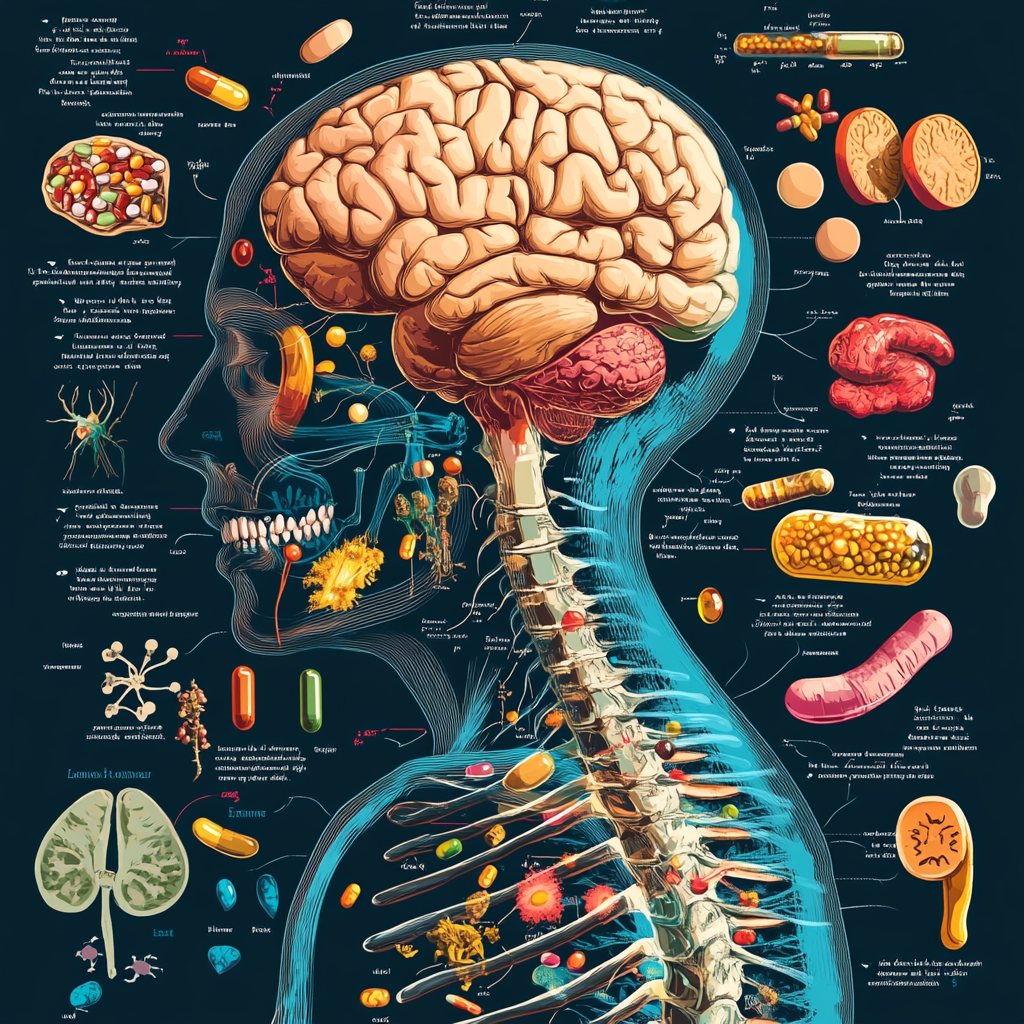Estimated reading time: 10 minutes
Sugar cravings can feel overwhelming. You might find yourself reaching for sweets when you’re stressed or tired. But why does this happen? Understanding sugar cravings is key to managing them effectively. Cravings often stem from more than just willpower. They can be linked to your body’s needs for certain nutrients.
Table of contents
Introduction to Sugar Cravings
Understanding Sugar Cravings
Sugar cravings are intense urges to consume sugary foods. They can occur for many reasons. For instance, your body may be low on energy, leading you to seek quick sugar fixes. Additionally, emotional factors can trigger these cravings. Stress, boredom, or sadness can make sweets seem more appealing.
Common Causes of Sugar Cravings
Several factors contribute to sugar cravings. They can be classified into psychological and physiological triggers.
Psychological Factors
Psychological factors play a major role in sugar cravings. When you’re feeling down or anxious, you might crave comfort foods. Sweets often provide a temporary sense of happiness. This is because sugar can trigger the release of feel-good hormones like serotonin. Consequently, this creates a cycle where you reach for sugar when you feel bad.
Physiological Triggers
On the other hand, physiological triggers are also important. These triggers often relate to your body’s nutritional needs. When your body lacks certain vitamins or minerals, it may signal cravings for sugar. This is particularly common if you’re not eating a balanced diet. A lack of essential nutrients can leave you feeling drained and in need of quick energy.
The Role of Vitamins in Metabolism
Vitamins are vital for your body’s metabolism. They help convert food into energy. Without the right vitamins, your body struggles to function effectively. This can lead to feelings of fatigue and cravings for quick energy sources, like sugar.
Overview of Metabolism and Nutrients
Metabolism involves many processes. It transforms the food you eat into energy. Essential vitamins play crucial roles in these processes. They help your body break down carbohydrates, fats, and proteins. When your body lacks these nutrients, it can lead to fatigue and sugar cravings.
Essential Vitamins for Energy Production
Several vitamins are particularly important for energy production. The B vitamins, for example, are essential. They help convert food into energy, keeping you feeling alert throughout the day. Without enough of these vitamins, you may feel sluggish. This can lead to cravings for quick energy sources like sugar.
How Vitamins Affect Blood Sugar Levels
Vitamins also impact your blood sugar levels. For instance, vitamin D helps regulate insulin, which controls blood sugar. If you’re deficient in vitamin D, your insulin levels may fluctuate. This can lead to spikes and drops in blood sugar, triggering cravings for sugar.
In summary, understanding what vitamin deficiency causes sugar cravings can be key to managing your diet and cravings. A balanced intake of essential vitamins can help maintain energy levels and reduce the need for sugary snacks.
Identifying Vitamin Deficiencies
Identifying vitamin deficiencies is crucial for managing sugar cravings. When your body lacks necessary vitamins, it can send signals through cravings. Knowing which vitamins to look for can help you regain control over your diet.
Common Vitamins and Their Functions
Different vitamins serve unique functions in your body. Understanding these can help you recognize deficiencies. Here are some common vitamins and their roles:
Vitamin B Complex
The B vitamins are essential for energy production. They include B1 (thiamine), B2 (riboflavin), B3 (niacin), B5 (pantothenic acid), B6 (pyridoxine), B7 (biotin), B9 (folate), and B12 (cobalamin). Each of these vitamins supports your metabolism in different ways. A deficiency in any of these can lead to fatigue and increased sugar cravings.
Vitamin D
Vitamin D is crucial for regulating calcium and phosphorus in the body. It also plays a role in insulin regulation. Low levels of vitamin D can lead to insulin resistance, making it harder for your body to manage blood sugar. This can cause cravings for sugary foods as your body seeks quick energy.
Symptoms of Vitamin Deficiencies
Recognizing the symptoms of vitamin deficiencies can help you address the issue early. Symptoms can be physical or behavioral, and they can significantly impact your cravings.
Physical Symptoms
Physical symptoms of vitamin deficiencies often include fatigue, weakness, and a general sense of malaise. You might notice that you feel tired even after a good night’s sleep. Additionally, you may experience muscle weakness or frequent colds. These symptoms can be annoying and may lead you to seek comfort in sugary snacks.
Behavioral Symptoms
Behavioral symptoms can be just as telling. You may notice changes in mood, such as increased irritability or anxiety. These emotional changes can trigger cravings for sweets. When you’re feeling down, sugary treats might seem like a quick fix. Understanding these symptoms can help you recognize when your cravings might be linked to a vitamin deficiency.

Which Vitamin Deficiencies Cause Sugar Cravings?
Certain sugar cravings vitamin deficiency can lead directly to sugar cravings. Identifying these deficiencies can help you manage your cravings effectively. Let’s explore how specific vitamins are linked to your desire for sugar.
Vitamin B1 (Thiamine) and Sugar Cravings
Vitamin B1, or thiamine, is essential for energy metabolism. It helps convert carbohydrates into glucose, which your body uses for fuel. Without enough thiamine, your energy levels may drop. As a result, you might crave sugar for a quick energy boost. Studies show that thiamine deficiency can lead to fatigue, making sugary snacks more tempting.
Vitamin B3 (Niacin) and Its Impact on Sugar Intake
Vitamin B3, also known as niacin, plays a vital role in the body’s metabolism. It helps convert food into energy and supports healthy brain function. When your body lacks niacin, you may feel tired and sluggish. This fatigue can trigger cravings for sugary foods, as your body seeks instant energy. Ensuring adequate intake of niacin-rich foods can help reduce these cravings.
Vitamin D Deficiency and Its Connection to Cravings
Vitamin D is crucial for many bodily functions, including insulin regulation. When your body doesn’t have enough vitamin D, it can lead to insulin resistance. This can cause spikes and drops in blood sugar levels, leading to increased cravings for sugar. Research indicates that people with low vitamin D levels often report higher sugar intake. Supplementing with vitamin D may help stabilize your blood sugar and reduce cravings.
Magnesium and Its Role in Sugar Regulation
Magnesium is another essential mineral linked to sugar cravings. It plays a role in glucose metabolism and insulin sensitivity. A deficiency in magnesium can lead to increased insulin resistance. As a result, your body may crave sugar to compensate for poor blood sugar control. Foods high in magnesium, like nuts and leafy greens, can help manage these cravings effectively.
How to Combat Sugar Cravings Linked to Vitamin Deficiencies
Addressing sugar cravings vitamin deficiency is key to managing sugar cravings. By making dietary changes, you can help your body get the nutrients it needs.
Dietary Changes to Include Essential Vitamins
Incorporate a variety of nutrient-rich foods into your diet. This will help ensure you’re getting all the essential vitamins. Here are some tips:
- Eat a Balanced Diet: Include whole grains, fruits, vegetables, lean proteins, and healthy fats.
- Choose Whole Foods: Opt for whole foods over processed options. They are often richer in vitamins and minerals.
- Consider Supplements: If you struggle to get enough nutrients from food, consider taking supplements after consulting with a healthcare professional.
Foods Rich in Vitamin B Complex
To boost your intake of B vitamins, include foods such as:
- Whole grains (brown rice, oats)
- Eggs
- Legumes (beans, lentils)
- Nuts and seeds
- Leafy green vegetables
Sources of Vitamin D and Magnesium
For vitamin D, consider:
- Fatty fish (salmon, mackerel)
- Fortified dairy products
- Sunlight exposure
To increase magnesium, eat:
- Dark chocolate
- Spinach
- Almonds
- Avocados
By focusing on these dietary changes, you can combat sugar cravings linked to vitamin deficiencies.

Lifestyle Changes to Manage Sugar Cravings
Managing sugar cravings isn’t just about diet. Lifestyle changes can also play a crucial role. By adjusting your daily habits, you can reduce cravings and improve your overall well-being.
Stress Management Techniques
Stress is a significant trigger for sugar cravings. When you’re stressed, your body seeks comfort, often in the form of sugary snacks. Implementing stress management techniques can help.
- Practice Mindfulness: Mindfulness meditation can reduce stress and improve your emotional health. Spend a few minutes each day focusing on your breath and clearing your mind.
- Engage in Relaxation Activities: Activities like yoga or deep-breathing exercises can help lower stress levels. These practices not only calm your mind but also reduce the urge to reach for sweets.
- Stay Organized: Managing your time effectively can reduce stress. Create a daily schedule and prioritize tasks to keep yourself on track.
Importance of Regular Physical Activity
Regular exercise is vital for maintaining a healthy lifestyle. It helps regulate blood sugar levels and reduces cravings. Here’s how:
- Boosts Mood: Exercise releases endorphins, the body’s natural feel-good chemicals. This can help combat emotional cravings for sugar.
- Improves Energy Levels: Physical activity increases energy and improves overall health. When you feel energetic, you’re less likely to crave quick energy sources like sugar.
- Regulates Blood Sugar: Regular exercise helps stabilize blood sugar levels. This can reduce fluctuations that lead to cravings.
Exercise and Its Effects on Sugar Cravings
Aim for at least 150 minutes of moderate exercise each week. This can be as simple as walking, cycling, or swimming. Find an activity you enjoy, as this will help you stick to your exercise routine.
Mindfulness and Emotional Eating
Mindfulness can also help you address emotional eating. Here are some strategies:
- Eat Mindfully: Pay attention to what and how you eat. Chew slowly and savor each bite. This can help you recognize when you’re truly hungry or just reaching for food out of habit.
- Identify Triggers: Keep a journal to track when you crave sugar. Note your emotions and surroundings during these times. This can help you identify patterns and triggers, allowing you to address them more effectively.
FAQs about Vitamin Deficiencies and Sugar Cravings
Common vitamin deficiencies include those in B vitamins, vitamin D, and magnesium. Each of these plays a role in energy production and blood sugar regulation.
If you frequently crave sugar and experience fatigue or mood swings, you might have a deficiency. Consider consulting a healthcare professional for a blood test to check your vitamin levels.
Yes, vitamin supplements can help if you’re deficient. However, it’s best to get your vitamins from food first. If you suspect a deficiency, talk to a healthcare provider before starting supplements.
Yes, deficiencies in minerals like chromium and zinc can also lead to cravings. Ensuring a balanced diet can help prevent these issues.
To improve vitamin absorption, eat a balanced diet rich in whole foods. Pairing certain foods, such as vitamin C-rich foods with iron sources, can enhance absorption. Additionally, staying hydrated and managing stress can aid in nutrient uptake.


